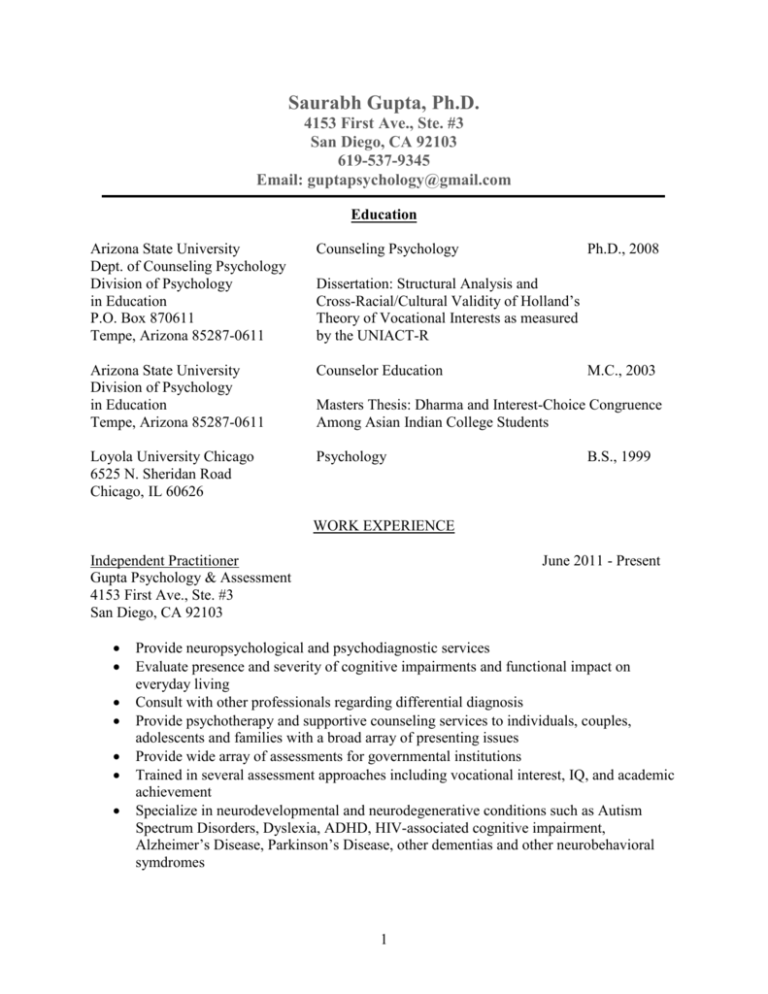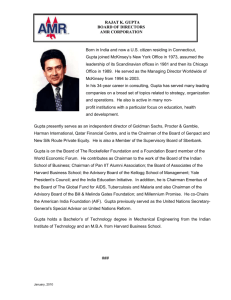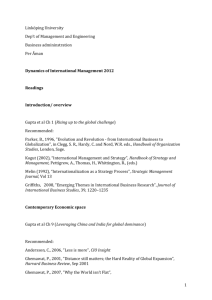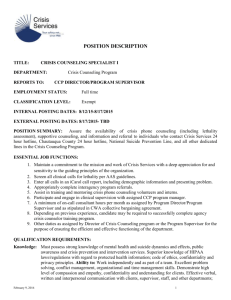Saurabh Gupta, M - Gupta Psychology
advertisement

Saurabh Gupta, Ph.D. 4153 First Ave., Ste. #3 San Diego, CA 92103 619-537-9345 Email: guptapsychology@gmail.com Education Arizona State University Dept. of Counseling Psychology Division of Psychology in Education P.O. Box 870611 Tempe, Arizona 85287-0611 Counseling Psychology Arizona State University Division of Psychology in Education Tempe, Arizona 85287-0611 Counselor Education Loyola University Chicago 6525 N. Sheridan Road Chicago, IL 60626 Psychology Ph.D., 2008 Dissertation: Structural Analysis and Cross-Racial/Cultural Validity of Holland’s Theory of Vocational Interests as measured by the UNIACT-R M.C., 2003 Masters Thesis: Dharma and Interest-Choice Congruence Among Asian Indian College Students B.S., 1999 WORK EXPERIENCE Independent Practitioner Gupta Psychology & Assessment 4153 First Ave., Ste. #3 San Diego, CA 92103 June 2011 - Present Provide neuropsychological and psychodiagnostic services Evaluate presence and severity of cognitive impairments and functional impact on everyday living Consult with other professionals regarding differential diagnosis Provide psychotherapy and supportive counseling services to individuals, couples, adolescents and families with a broad array of presenting issues Provide wide array of assessments for governmental institutions Trained in several assessment approaches including vocational interest, IQ, and academic achievement Specialize in neurodevelopmental and neurodegenerative conditions such as Autism Spectrum Disorders, Dyslexia, ADHD, HIV-associated cognitive impairment, Alzheimer’s Disease, Parkinson’s Disease, other dementias and other neurobehavioral symdromes 1 Assistant Project Scientist HIV Neurobehavioral Research Center & Translational Methamphetamine Research Center 220 Dickinson St., 3rd Floor San Diego, CA 92103 Oversee the management of data collection and analysis of data in three active NIHfunded studies of behavioral genetics, HIV and Methamphetamine Dependence, and functional impact of HIV infection Write grants to different institutional centers of the National Institutes of Health to fund projects associated with Methamphetamine and NeuroAIDS research Conduct clinical investigations of the effect of genetic variation in dopamine system genes on high-risk behavior and risk for cognitive impairment in HIV Analyze and report on ante-mortem data of the effect of genetic variation in methamphetamine metabolism genes from a post-mortem sample Travel internationally to developing nations to train investigators in affiliated universities in neuropsychological test administration, data collection and research methods Analyze and report on data of the functional impact of HIV infection in Spanish speakers Collaborate with HNRC-TMARC investigators on a variety of research projects Present research findings to HNRC-TMARC investigators and graduate students Post-Doctoral Research Fellow HIV Neurobehavioral Research Center 220 Dickinson St., 3rd Floor San Diego, CA 92103 July 2008-July 2010 Oversee the management of data collection and analysis of data being collected in a project studying neurobehavioral effects of HIV and host genetics in China Conduct studies on neurocognitive impact of HIV in a developing country within two widely different contexts: rural and urban Also study associations between neurocognitive, neuromedical, psychiatry, laboratory and demographic data Present findings at national and international conferences Participate in peer education through article review and in-house research presentations Collaborate with neurologists, neuroradiologists, psychiatrists, infectious disease specialists, and neurobiologists School Counselor St. Paul’s Preparatory Academy P.O. Box 32650 Phoenix, AZ 85064 August 2010 - Present April 2006-May 2007 Provided individual, group and family counseling to high school students attending therapeutic college preparatory boarding school. Students typically had clinically relevant personal histories, such as substance abuse diagnoses, Major Depression, Anxiety disorders, 2 Obsessive-Compulsive Disorder, Bipolar I and Oppositional Defiant Disorder and occasionally criminal involvement. Performed case management functions such as coordinating care with psychiatric nurse practitioner, teachers, prior therapists, parents, educational consultants and other school personnel. Conducted therapeutic and psychoeducational groups centered on specific topics such as adoption, interpersonal communication/relationships and goal setting. Participated in daily staffings to discuss status of individual students’ progress Senior Research Assistant Barrow Neurological Institute St. Joseph’s Hospital – CHW 350 W. Thomas Rd. Phoenix, AZ 85013 Supervisor: George Prigatano, Ph.D. April 2003 – April 2006 Identified research participants from hospital’s trauma registry. Reviewed medical records and specifically radiology reports to identify potential subjects for study. Project goals were to examine the social, educational outcomes and neuropsychological sequelae of pediatric traumatic brain injury. Recruited participants for study and also administered research protocol assessment batteries. Entered data, modified large database as needed and conducted all analyses to answer research questions. Administered research protocols to over 200 children in schools serving predominantly Mexican-American communities. Children were tested as part of a standardization study to develop norms for a new screening test developed for the acute and post-acute phases of recovery from TBI. Three co-authored publications are associated with this project thus far. Summer Research Intern ACT, Inc. June 2005 500 ACT Drive August 2005 P.O. Box 168 Iowa City, Iowa 52243-0168 Was selected from a national pool of applicants for summer research internship at ACT, Inc. Used structural analytic techniques to investigate the cross-cultural validity of the theory upon which ACT’s interest inventory is based. Specifically, tested model-data fit for various self-identified racial/ethnic groups. Research Associate Relevance of Culture in Evaluation Institute (NSF funded) Arizona State University Tempe, AZ 85287 Supervisor: Stafford Hood, Ph.D. August 2000 – May 2005 Recruited local school districts classified as under-performing for involvement in the School improvement plans. Worked with teachers nominated by their districts to conduct culturally 3 responsive program evaluations with the aim of developing school improvement plans. Students served in these districts were primarily poor students of color. Worked with educational consultants in the development of a curriculum for a new professional institute chartered with training culturally responsive program evaluators. Substance Abuse Counselor Youth Service Project 3942 W. North Ave. Chicago, Illinois 60647 Supervisor Erick Guerrero, M.A. June 1999 – July 2000 Delivered addiction counseling services in a community mental health agency. Clients were primarily African American and Latino inner-city adolescents mandated for treatment by juvenile courts for non-violent drug offenses. Vast majority of clients had history of membership in street gangs. All were under some form of state supervision (probation or parole). Conducted assessments, and individual, group and family counseling. Also provided psychoeducational interventions for relapse prevention. Assisted clients in resume’ writing and vocational placement. Coordinated treatment and monitoring with probation/parole officers and advocated for clients in court, where appropriate. Also made referrals to inpatient treatment when necessary. Responsibilities also included early intervention in the form of mentorship with preadolescents who committed minor offenses. SUPERVISORY EXPERIENCES Supervisor-in-Training Counselor Training Center Payne Hall, 401 Arizona State University Tempe, Arizona 85287 Supervisor: Judith Homer, Ph.D. (Licensed Psychologist) August 2005 – December 2005 Served as a primary supervisor to master of counseling practicum student enrolled in first practicum course. Provided one hour of one-to-one supervision each week focusing on the development of counseling and psychodiagnostic skills, case conceptualization, intervention and application of theory. Conducted four hours of direct live observation of trainee each week, behind one-way mirror. Received one hour of one-to-one “supervision of supervision” each week with licensed psychologist on staff and participated in a yearlong didactic supervision doctoral course that included three hours of group supervision/seminar each week with other doctoral student supervisors. Group Supervisor – Masters of Counseling Internship Course Division of Psychology in Education CED 684 Internship in Community Counseling Course Payne Hall, 446 4 January 2005 May 2005 Arizona State University Tempe, Arizona 85287 Supervisor: Sandra Dannenbaum, Ph.D. Provided group supervision to masters of counseling students who were on internship placements. Provided guidance in case conceptualization, treatment planning and intervention, and counselor development, with an emphasis on adherence to ethical principles of practice. PRE-DOCTORAL INTERNSHIP IN CLINICAL PSYCHOLOGY (APA-Accredited) Pacific Islands Veterans Affairs Healthcare System June 2007 – June 2008 459 Patterson Road Honolulu, HI 96815 Supervisors: Tanya J. Schwartz, Ph.D., ABPP-CN (Neuropsychology Rotation) Joanne Magee, Ph.D. (Mental Health Clinic Rotation) Katy Lysell, Ph.D. (Psychotherapy Rotation) Patrick Armistead-Jehle, Ph.D. (Clinical Assessment/Psychodiagnosis Rotation) Steven Miyake, Ph.D. (Traditional and Alternative Therapy Rotation) Neuropsychology Rotation (June ’07-December ’07, 20hrs/week): Independently conducted clinical interviews of patients under supervision Administered a wide variety of neuropsychological assessment instruments to a broad group of veterans with a variety of presenting complaints Independently wrote neuropsychological assessment reports integrating interview data, collateral information, medical record data, personality and cognitive test results and behavioral observations. Participated in giving patients and their families appropriate and therapeutic feedback of test results Attend didactics and conferences devoted to neuropsychological research and practice Mental Health Clinic Rotation (June ’07-December ’07, 20hrs/week): Provided individual and couples psychotherapy to both male and female veterans and their spouses Psychotherapy patients range in age throughout the adult lifespan Patients present with a broad scope of presenting symptoms/concerns Received intensive training in prolonged exposure-based therapy for PTSD Facilitated a psychoeducational weight management group for vets with a focus on losing weight and making sustainable lifestyle changes and healthier choices Psychotherapy Rotation (January ’08 – June ‘08, 10 hrs/week): Previously unavailable rotation I requested to be able to continue treatment with subset of patients from Mental Health Clinic Rotation who needed longer-term psychotherapy Patients’ diagnoses included chronic, severe depression; personality disorder; panic disorder; weight management patient; and patient with adjustment disorder due to stage of life change Clinical Assessment/Psychodiagnosis Rotation (January ’08 – June ‘08, 10 hrs/week): 5 Previously unavailable rotation I requested to both fill a need in the clinic and also to gain further training in objective measures such as MMPI-2, PAI, MCMI-III, 16PF, etc. Assisted psychiatric residents and other clinic teams in differential diagnosis and evaluation of patients with suspected Axis II disorders Wrote comprehensive psychological reports Made recommendations vis-à-vis treatment considerations & prognosis specific to patients’ diagnostic labels and individual differences Refered patients directly to other clinics and/or programs to meet other treatment needs Traditional and Alternative Therapy Rotation (January ’08 – June ‘08, 20 hrs/week): Treated patients using biofeedback, complemented with CBT Patient groups referred for treatment included pain management; panic disorder, with and without agoraphobia; PTSD and other anxiety disorders; and stress management Co-facilitated “Health and Spirituality” group with station Chaplain and supervisor SUPERVISED PRACTICA EXPERIENCES Neuropsychology Practicum Student (Doctoral field practicum) Baker Neuropsychology 301 E. Bethany Home Rd. Phoenix, AZ 85003 Supervisor: Jason J. Baker, Ph.D. • • • • • • • Participated in clinical/diagnostic interviews of patients. Administered broad range of traditional and contemporary neuropsychological assessment devices to patients representing all age groups, from young children to the elderly. Recorded behavioral observations. Provided consultation to supervisor in report writing. Wrote neuropsychological reports integrating neuropsychological and personality test findings and behavioral observations. Individual therapy Participated in feedback sessions. Psychology Intern (Doctoral field practicum) Desert Vista Hospital 750 W. Brown Mesa, AZ 85257 Supervisor: Bradley White, Ph.D. January 2006 – August 2006 August 2004 May 2005 Co-facilitated daily psychotherapy groups for psychiatric inpatients with serious mental illnesses. Patients suffered from various psychotic disorders, major mood disorders, bipolar disorder I and II, personality disorders, indigence, homelessness and substance abuse. Interventions and treatment were modeled after Irvin Yalom’s in-patient group psychotherapy model. 6 Co-facilitated psychoeducational groups with seriously mentally ill patients. Groups were designed to teach life skills, medication compliance, coping with mental illness and other interventions targeted toward this population. Acted as participant-observer in clinical interviews and personality, intellectual and limited neuropsychological testing. As tenure progressed, was given opportunity to take the lead in assessments while supervisor oversaw process. Emphasis in supervision was on proper psychodiagnosis and how it affects treatment planning and interventions. Environment was highly interdisciplinary. Was also given some opportunity for brief individual therapy, when clinically indicated. Witnessed legal proceedings associated with treatment of SMI populations. Facility contained a mental health court, where patients were petitioned for court ordered treatment by family members, the police and healthcare providers. Patients were declared a danger to self (DTS), danger to others (DTO), gravely disabled (GD), persistently and acutely disabled (PAD), or a combination of some or all of these Psychometrician (Doctoral Fieldwork) Beljan Psychological Services 435 E. Camelback Rd. Phoenix, AZ 85018 Supervisor: Paul Beljan, Psy.D. July 2003 – January 2004 Administered full neuropsychological battery to children ages 5-17. Teachers, school personnel, and physicians were primary referral sources. Children were referred for the assessment of various developmental disorders, ADD, ADHD, Traumatic Brain Injury, prenatal drug/alcohol exposure, and also giftedness. Wrote integrated reports based on test data and clinical observations. Also co-facilitated clinical interviews and feedback session with parents. Provided consultations with schools and concerned teachers regarding teaching strategies and management of classroom behavior, sometimes within the context of an IEP (Individualized Education Plan). Doctoral Practicum Counselor Training Center August 2002 Payne Hall, 401 May 2003 Arizona State University Box 871012 Tempe, Arizona 85287 Supervisor: Judith Homer, Ph.D. (Licensed Psychologist) Responsible for initial intake assessments and provision of individual and family counseling to clients from the Arizona State University and the Phoenix metropolitan area. Department clinic setting with videotaped counseling rooms and one-way mirror for supervision. Addressed client problems including mood disorders, panic attacks, PTSD, family dynamics, couple relational problems, anger management, Substance abuse and career concerns. 7 Counselor (Masters Internship) Prehab of Arizona May 2002 Dorothy B. Mitchell Counseling Center August 2002 1655 E. University Dr. #100 Mesa, AZ 85302 Supervisors: William Jenkins, Ph.D./ Tony Floda, Psy.D. Worked with children and families and provided individual and family therapy. Also conducted some intake assessments and psychoeducational groups to help parents develop more effective parenting skills. Clientele were primarily families living below poverty line and receiving services through state subsidized mental health program. Some clients were adolescent wards of the state of Arizona, residing in group homes or residential treatment centers. Children ranged in age from 7 to 17 years. Oncology Counselor (Masters Internship) Desert Samaritan Medical Center January 2002 1400 S. Dobson Rd. May 2002 Mesa, AZ 85202 Supervisor: Bill Jenkins, M.C. Provided counseling services to patients receiving treatment for cancer. Also provided counseling for family members and friends of patients as needed. Also facilitated family therapy sessions to help families to cope with sudden changes in the health status of a family member. Co-facilitated support group for cancer patients and family members. Group members also included widows of former patients. When requested by family, also provided counseling and support services in hospice setting and later, bereavement counseling. Masters Practicum Counselor Training Center August 2001 Payne Hall, 401 December 2001 Arizona State University Box 871012 Tempe, Arizona 85287 Supervisor: Theresa Gates, Ph.D. Cumulative Hours: 42 direct service hours, 16 supervision hours Responsible for initial intake assessments and provision of individual and family counseling to clients from the Arizona State University and the Phoenix metropolitan area. Department clinic setting with videotaped counseling rooms and one-way mirror for supervision. Client concerns included couple relational problem, eating disorder, career concerns, alcoholism, depression, low self-esteem, and social skills training. 8 TEACHING EXPERIENCE Psychiatry Seminar Series: Psychological and Neuropsychological Assessment University of California San Diego School of Medicine PSY 6101: Cognitive and Affective Bases of Behavior – Instructor California School of Professional Psychology Alliant International University CED 545: Analysis of the Individual – Co-Instructor Arizona State University Department Counseling Psychology and Counselor Education Summer, 2011 1/2010 – 5/2010 8/2006 – 12/2006 PSY 290: Research Methods Laboratory - Instructor Arizona State University Department of Psychology 1/2006 – 5/2006 CED 111: Explorations in Education - Instructor Arizona State University College of Education 8/2005 – 12/2005 UNI 100: Introduction to the University - Instructor Arizona State University Dept. of Undergraduate Academic Service 8/2003 – 12/2003 DISTINCTIONS Was awarded Arizona State University research grant to fund master’s thesis research. University-wide competition for just 25 grants (2002). Awarded two scholarships from the Barrow Neurological Institute and St. Joseph’s Hospital in Phoenix for outstanding research work on Children’s TBI study and outreach efforts to educate Hispanic community about automobile child-seats and TBI (2003, spring and fall). Selected from among a national pool of applicants to participate in a summer research internship at ACT, Inc. (2005) Nominated for, and awarded “Graduate Student Research Award” to attend American Educational Research Association’s Spring 2006 conference and participate in symposium where I presented portion of my dissertation results. Selected by ASU’s College of Education to receive “Excellence in Research Award.” Competition held by the college to evaluate the best defended dissertation of that academic year. Evaluation based on originality, methodology and potential impact on the field. Nominated by dissertation chair for APA Division 17 Barbara Kirk Student research award. Recipient of the 2008 AERA: Division E Outstanding Dissertation Award in Counseling. 9 Recipient of the 2008 Society for Vocational Psychology Outstanding Dissertation Award Recipient of 2009 APA Division 40’s (Division of Clinical Neuropsychology) Blue Ribbon Award for Excellence in Scientific Presentation Named a 2011 Fellow in the Interdisciplinary Fellowship in NeuroAIDS training program. PUBLISHED PAPERS (in order from most recent) Gupta, S., Bousman, C. A., Chana, G., Cherner, M., Heaton, R. K., Deutsch, R., Ellis, R. J., Grant, I., & Everall, I. P. (2011). Dopamine receptor D3 genetic polymorphism (rs6280TC) is associated with rates of cognitive impairment in methamphetamine-dependent men with HIV: preliminary findings. Journal of NeuroVirology, 17, 239-247. Atkinson, J. H., Jin, H., Shi, C., Xin, Y., Duarte, N. A., Casey, C. Y., Franklin, D. R., Vigil, O., Cysique, L., Wolfson, T., Riggs, P. K., Gupta, S., Letendre, S., Marcotte, T. D., Grant, I., Wu, Z., Heaton, R. K., & HNRC group. (2011). Psychiatric context of human immunodeficiency virus infection among former plasma donors in rural China. Journal of Affective Disorders, 130, 421-428. Gupta, S., Vaida, F., Riggs, K., Jin, H., Grant, I., Cysique, L., Shi, C., Yu, X., Wu, Z., Heaton, R. K., & HNRC Group. (2010). Neuropsychological Performance in Mainland China: The Effect of Urban/Rural Residence and Self- Reported Daily Academic Skill Use. Journal of the International Neuropsychological Society, 17, 1-11. Spector, S. A., Singh, K. K., Gupta, S., Cysique, L. A., Jin, H., Letendre, S., Schrier, R., Wu, Z., Hong, K. X., Yu, X., Chuan, S., & Heaton, R. K. (2010). APOE ε4 and MBL-2 O/O genotypes are associated with Neurocognitive impairment in HIV-infected plasma donors from Anhui Province, China. AIDS, 24(10). Cysique, L.A., Letendre, S. L., Ake, C., Jin, H., Franklin, D. R., Gupta, S., Shi, C., Yu, X., Wu, Z., Abramsom, I. S., Grant, I., Heaton, R. K. & HNRC group. (2010). Incidence and nature of cognitive decline over one year among HIV-infected former plasma donors in China. AIDS, 24, 983-990. Gupta, S., Woods, S. P., Weber, E., Dawson, M. S. & Grant, I. (2010). Is prospective memory a dissociable cognitive function in HIV infection? Journal of Clinical and Experimental Neuropsychology, 27, 1-11. Gupta, S., Tracey, T. J. G. & Gore, P. A. (2008). Structural examination of RIASEC scales in high school students: Variation across ethnicity and method. Journal of Vocational Behavior, 71(4). Prigatano, G. P., Gupta, S. & Gale, S. D. (2007). Fuld Object Memory Evaluation Adapted for School-Age Children. Developmental Neuropsychology, 32(3), 757-768. 10 Prigatano, G. P., & Gupta, S. (2006). Friends after traumatic brain injury in children. Journal of Head Trauma Rehabilitation, 21(6), 505-513. Gupta, S., & Tracey, T. J. G. (2005). Dharma and interest-occupation congruence in Asian Indian college students. Journal of Career Assessment, 13(3), 320-336. Prigatano, G. P., Gupta, S. & Lomay, V. T. (2005). Construct validity of the BNI Screen for Higher Cerebral functions for School Age Children. BNI Quarterly, 21(4), 4-7. Prigatano, G. P., Gupta, S. & Lomay, V. T. (2005). A screening test for cognitive and affective functioning in school-age children with traumatic brain injury. BNI Quarterly, 21(4), 8-13. Prigatano, G. P., Gupta, S. & Lomay, V. T. (2005). Test-Retest Reliability of the BNI Screen for Higher Cerebral functions for School Age Children. BNI Quarterly, 21(2), 22-24. PUBLICATIONS CURRENTLY UNDER REVIEW Schrier, R. D., Gupta, S., Riggs, P., Cysique, L. A., Letendre, S., Jin, H., Spector, S. A., Singh, K. K., Wolfson, T., Wu, Z., Hong, K. X, Yu, X., Shi, C., Heaton, R. K., & the HNRC Group. (under review). The influence of HLA on HIV associated neurocognitive impairment in Anhui, China. AIDS. BOOK CHAPTERS AND REVEIWS Gupta, S. (2010). [Review of the book HIV and the Brain: New Challenges in the Modern Era]. Antiviral Therapy, 15, 131-132. Tracey, T, J, G. & Gupta, S. (2007). Interest assessment in an international context. In Athanasou, J., & Van Esbroeck, R. (Eds.), International Handbook of Career Guidance. London: Springer. PRESENTATIONS Gupta, S. & Heaton, R. K. (2010, April). Neurocognitive Performance in Mainland China: The Urban vs. Rural Effect. Poster session presented at the annual UCSD, Department of Psychiatry Junior Faculty and Postdoctoral Research Symposium, San Diego, CA. Gupta, S., Woods, S. P., Weber, E., Dawson, M. S., Grant, I., & The HNRC Group. (2009, August). Is prospective memory a dissociable cognitive function in HIV infection? Paper presented as a Blue Ribbon awardee at the annual meeting of the American Psychological Association (Division 40) in Toronto, Canada. Gupta, S., Cysique, L. A., Woods, S. P., Grant, I., Heaton, R. K., & HNRC group. (2009, February). Investigation of Failed Hiscock Digit Memory Test performance in a sample 11 of HIV+ women in rural China. Presented at the meeting of the International Neuropsychological Society, Atlanta, Georgia. Gupta, S., Gore, P. A., Jr., & Tracey, T. J. G. (2006, April). Structural analysis of the crosscultural validity of Holland’s model of vocational interests. In Tracey, T. J. G., (Chair). New directions in interest research, Symposium presented at the annual meeting of the American Educational Research Association, San Francisco. Gupta, S. (2004, August). Dharma and career choice/interest congruence among Asian Indian College Students. Poster session presented at the American Psychological Association Annual Convention, Honolulu, Hawaii. Gupta, S., Chee, C., Zabon, S. A., & Blankson, G. L. (2004, January). Culturally responsive program evaluation. In S. Hood (Chair), Training educators of color to be culturally responsive program evaluators. Symposium conducted at the annual meeting of the Relevance of Assessment and Culture in Evaluation conference, Tempe, AZ. Lee, D., Maynard-Reid, N., & Gupta, S. (2002, January). Infusing multicultural competencies across the curriculum. Poster session presented at the annual meeting of the Relevance of Assessment and Culture in Evaluation conference, Tempe, AZ. 12







